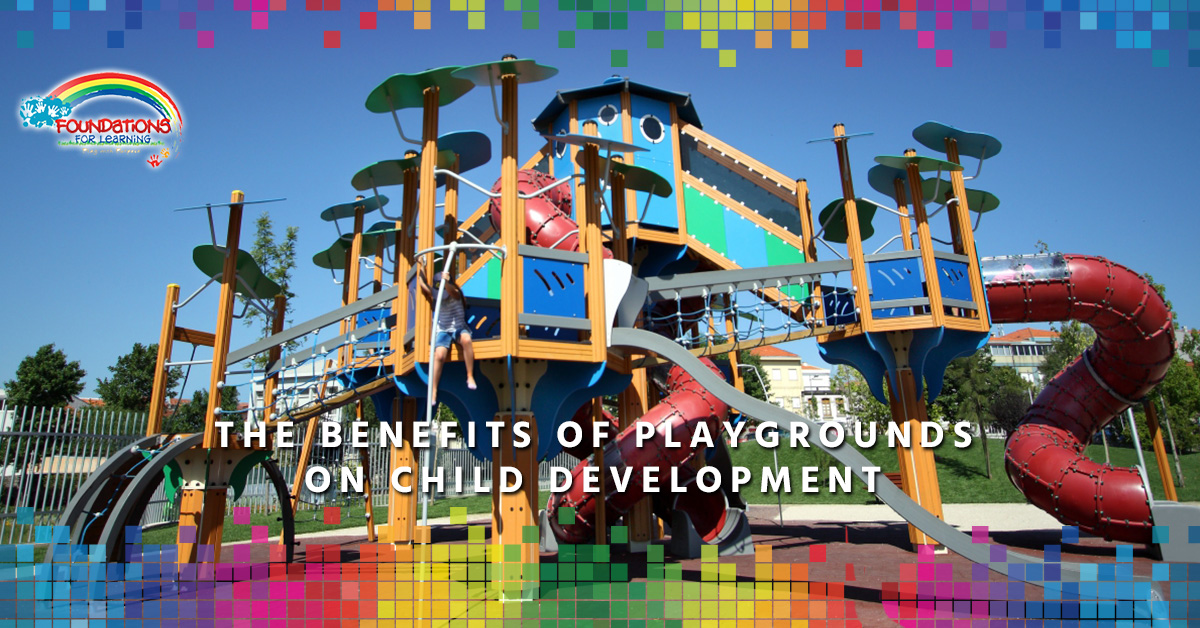The Benefits of Playgrounds on Child Development

At Foundations for Learning, we are proud to offer an environment in which children can thrive. Our facilities is specially designed to promote healthy development, from the staff members we hire to the design of our classrooms. One part of our facility that is very important to us is our playground. Many adults don’t realize the significance of the playground in terms of a child’s physical, social, mental, and emotional development, but active playtime is essential for your child. According to a report by the Shasta Children and Families First Commission, playground play a vital role in the development of children, and should be prioritized by teachers and parents alike. In this blog, we will go over the different ways your child benefits from playgrounds.
Physical Benefits
Perhaps most obviously, playgrounds are beneficial to a child’s physical health. With a playground, children can run, jump, climb, slide, and move in general, giving your child a healthy outlet for exercise. The slide allows your child to climb, strengthening their legs; the monkey bars allows them to exercise their shoulders and arms, and the jungle gym incorporates their full body into a workout. On top of all that, children run from one piece of equipment to another, allowing them to get great cardiovascular exercise.
Social Benefits
Playgrounds benefit children’s physical health, but also play an important role in their psychosocial development. During playtime, children are spending time together, and this is a crucial time in which they will learn how to interact with each other. Preschool is an important time of life in terms of many aspects of development, particularly socially. On the playground, children learn how to take turns with one another and practice self-control as they wait; they can play together and work collaboratively; and they can bond through conversation and imaginative play. Playgrounds help children develop social skills, which benefits our society as a whole as our youngest members learn citizenship and manners. Children from all different backgrounds come together on the playground, fostering camaraderie.
Self-Esteem Benefits
Playgrounds offer the perfect environment in which children can develop confidence and self-esteem. Whether it is traveling across the monkey bars or climbing up a rope ladder, when you watch your preschooler conquer a new piece of playground equipment, you can see their growing self-confidence in their grinning face. Playgrounds give children the opportunity to conquer their fears as they try new things and accomplish them. Even if they are not engaging with more physically challenging equipment, play in general benefits children with their self-esteem. Playgrounds offer an arena in which they can explore the world through imagination, trying on different emotions and learning about all the possibilities of life. As Albert Einstein said, “Play is the highest form of research.” If play is research, playgrounds are a lab in which children conduct life experiments.
Mental Benefits
According to the Shasta report referenced above, playground equipment isn’t just necessary for physical development; it also plays an important role in mental develop. As your youngster goes about their daily lives, they are constantly learning about the world, and the playground presents the perfect place for this type of learning. By engaging their motor skills and providing them with a variety of sensory experiences, playgrounds give children what they need to maximize their brain development. The first six years of life are arguably the most important for brain development, and by allowing children to practice their motor and sensory skills on playground equipment, it allows their brains to form more and stronger neural connections, promoting optimal mental development.
Ethical Development
Playgrounds are important for children’s physical, mental, and social development, but it is also the arena in which they develop their moral character. Most people don’t consider this, but the playground is where children first learn about what is fair and what is not. They learn how to take turns, share, and show respect to one another. On the playground, children learn how to treat other people, making it important to help them develop ethics.
At Foundations for Learning, we are proud to provide our students with the playground they need to develop into their best selves. Come visit our daycare facility in Glastonbury for a tour of our facility to see if it is a good match for you and your child.

